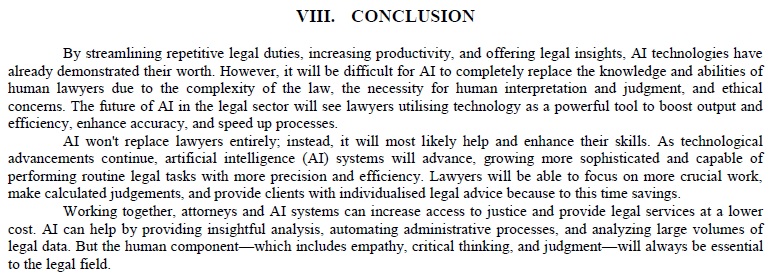A View AI: A Standby of Solicitors and Cataloger in the Era of - AI
DOI:
https://doi.org/10.54741/asejar.2.6.3Keywords:
artificial intelligence, legal profession, automation, augmentation, problem- solvingAbstract
Artificial intelligence has brought in significant enhancements in various sectors and there is no surprise, it has also shown many interests in the legal profession. Particularly, the usage of AI reduced the need for employees and improved ability to solve problems capabilities. Prior to AI's involvement, paralegals handled plenty of paperwork and arduous stages of litigation that had to be finished so as to ensure due diligence.
When evaluated against the subjective nature of the human mind, the arrival of AI into the world of law may bring a number of benefits. support for legal analysis and research, drafting, case management, and document review associated with the matter being heard. With more improvements, it surely can be made to be equivalent to an experienced lawyer.
Additionally, the idea of paperless courts has been introduced to lessen the usual load of trial procedures.1 Nevertheless, when trying to rebut the claim, AI is not equivalent to the brain of an individual in terms of advocacy, where the core of advocacy is the belief that while AI has several advantages of its own, it also has shortcomings which require to be taken into perspective. Against the other side and any evidence, they may present, the judge takes up defence.
Downloads
References
Affum, Mark Quaye. (2023). The role of artificial intelligence in library automation. Library Philosophy and Practice(eJournal). https://digitalcommons.unl.edu/libphilprac/7880.
Anon. n.d. (2023). ChatGPT. Retrieved November 26, 2023 from: https://chat.openai.com.
Gill, Sukhpal Singh, & Rupinder Kaur. (2023). ChatGPT: Vision and challenges. Internet of Things and Cyber-Physical Systems, 3, 262–71. doi:10.1016/j.iotcps.2023.05.004.
Goudar, Pratibha, & Rani Shilpa. (2023). ChatGPT: A boon to library service. 7(1), 8-13.
Holmes, Wayne, Jen Persson, Irene-Angelica Chounta, Barbara Wasson, & Vania Dimitrova. (2022). Artificial intelligence and education: A critical view through the lens of human rights, democracy and the rule of law. Strasbourg: Council of Europe.
Kumar, Arnab. (2018). National strategy for artificial intelligence. NITI Aayog.
M. Alshater, Muneer, Mali, Tanaji, & Rahul Deshmukh. (2023). Use of ChatGPT in library services. IJCRT, 11(4). doi:10.1729/Journal.33816.
Momoh, Emmanuel, & Abubakar Folorunsho. (2019). The evolving roles of libraries and librarians in the 21st century. Library Philosophy and Practice (e-Journal).
Raju, Komalla. (2021). A vital role of academic library in higher education in the digital age. JETIR, 8(11).
Ramos, Leo, Ronald Marquez, & Francklin Rivas. (2023). AI’s next frontier: The rise of ChatGPT and Its implications on society. Industry, and Scientific Research, 44, 131–48.
Vidya, College. (2021). What is chat gpt? - 10 ways to use chat gpt for students. Vidya Blog.
Yuan, Xueqing. (2021). Research on the development of library in the era of artificial intelligence. 16th International Conference on Computer Science & Education (ICCSE).
Yusuf, Tunde Idris, Odunola Adefunke Adebayo, Lateef Alhaji Bello, & Joseph Olusegun Kayode. (2022). Adoption of artificial intelligence for effective library service delivery in academic libraries in Nigeria. Library Philosophy and Practice (e-Journal).

Downloads
Published
How to Cite
Issue
Section
ARK
License
Copyright (c) 2023 Naimishkumar R Patel, Dr.Vikas Tulshyan

This work is licensed under a Creative Commons Attribution 4.0 International License.
Research Articles in 'Applied Science and Engineering Journal for Advanced Research' are Open Access articles published under the Creative Commons CC BY License Creative Commons Attribution 4.0 International License http://creativecommons.org/licenses/by/4.0/. This license allows you to share – copy and redistribute the material in any medium or format. Adapt – remix, transform, and build upon the material for any purpose, even commercially.










